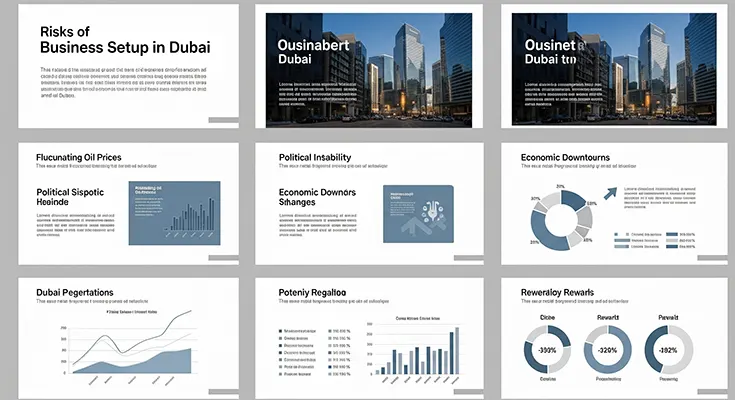Key Takeaways:
- While Dubai offers numerous advantages, potential risks for Business setup in Dubai include regulatory complexities and evolving compliance requirements.
- The highly competitive market can make it challenging for new businesses to establish a strong foothold.
- Corporate bank account opening can be a lengthy and rigorous process, posing a significant hurdle for new entities.
- Cultural nuances and language barriers, although often minor in the business sphere, can present communication challenges.
- Misunderstanding jurisdictional limitations (mainland vs. free zone) can restrict market access and future growth.
Dubai has rightfully earned its reputation as a global business hub, attracting entrepreneurs and investors with its attractive tax policies, strategic location, and modern infrastructure. However, like any major economic center, a Business setup in Dubai is not without its potential risks and challenges. Acknowledging and understanding these factors is crucial for effective planning and to build a resilient venture in this dynamic environment. Proactive preparation can help mitigate many of these common pitfalls, turning potential obstacles into manageable steps.
Navigating Regulatory and Compliance Challenges for Business setup in Dubai
One of the primary areas of risk for a Business setup in Dubai lies within its regulatory landscape, which, while clear, can be complex and subject to change.
- Evolving Legal Frameworks: The UAE’s legal and regulatory environment is continuously adapting to global standards and local economic needs. New laws, such as the introduction of Corporate Tax, Ultimate Beneficial Owner (UBO) declarations, and Economic Substance Regulations (ESR), require businesses to stay updated and compliant. Failing to keep pace with these changes can lead to fines, penalties, or even license suspension. For foreign investors unfamiliar with the local legal system, understanding the nuances of these laws can be challenging.
- Jurisdictional Limitations: Dubai offers various business structures, primarily mainland and free zone. While free zones offer 100% foreign ownership and tax incentives, they often come with limitations on conducting business directly with the mainland market. Conversely, mainland companies may have wider market access but might require a local Emirati partner for certain activities. Choosing the wrong jurisdiction for your Business setup in Dubai can severely limit your operational scope and growth potential later on.
- Activity-Specific Approvals: Many business activities in Dubai require additional approvals from various government ministries or departments beyond the main licensing authority. For instance, healthcare businesses need approvals from the Dubai Health Authority, and financial services require oversight from regulatory bodies like the Central Bank or Dubai Financial Services Authority (DFSA). Missing or delaying these specific approvals can halt the entire setup process.
- Documentation and Attestation: The documentation requirements for Business setup in Dubai can be extensive, especially for foreign shareholders or complex corporate structures. Documents often need to be legalized and attested in the country of origin and then by the UAE Ministry of Foreign Affairs. Errors in documentation or failure to provide properly attested papers can lead to significant delays and rejections.
- Visa and Labor Law Compliance: Managing employee visas and ensuring compliance with the UAE’s labor laws can be intricate. This includes understanding visa quotas, medical fitness requirements, Emirates ID registration, and adhering to strict rules regarding employment contracts, working hours, end-of-service benefits, and termination procedures. Non-compliance can result in substantial fines and legal disputes.
Diligent research and the use of experienced local consultants are often recommended to mitigate these regulatory complexities.
Market Competition and Economic Fluctuations for Business setup in Dubai
Dubai’s attractiveness as a business destination also means intense competition and exposure to broader economic shifts, posing another set of risks for a Business setup in Dubai.
- Highly Competitive Market: Dubai is a magnet for businesses worldwide, resulting in a saturated market across many sectors. New entrants face the challenge of competing with established local businesses, international brands, and a constant influx of new startups. Standing out requires a clear unique selling proposition, robust marketing, and a deep understanding of consumer preferences.
- Market Saturation: Certain sectors, such as retail, F&B, and real estate, are particularly saturated. Entering these markets without a well-defined niche or a highly differentiated product/service can lead to struggles in gaining market share and profitability. Thorough market research is paramount to identify genuine gaps or strong competitive advantages.
- Economic Sensitivity: While Dubai’s economy is diversified, it remains susceptible to global economic trends, oil price fluctuations (though less directly than in the past), and regional geopolitical developments. Economic downturns, shifts in tourism numbers, or changes in global trade dynamics can impact consumer spending and business revenues, affecting the viability of a Business setup in Dubai.
- Cash Flow Management and Payment Delays: New businesses, especially small and medium-sized enterprises (SMEs), can face challenges with cash flow due to high initial setup costs, ongoing operational expenses, and potential delays in client payments. In some cases, particularly with larger clients or government contracts, payment cycles can be extended, requiring businesses to maintain sufficient working capital.
- Cost of Doing Business: While corporate tax rates are low and certain free zones offer incentives, the overall cost of a Business setup in Dubai can be significant. This includes licensing fees, office rent (especially for mainland or large physical offices), visa costs, staff salaries (which include living allowances due to high cost of living), and marketing expenses. Underestimating these costs can lead to financial strain.
Strategic pricing, efficient operations, and a strong financial buffer are essential to withstand market pressures and economic shifts.
Operational and Financial Hurdles for Business setup in Dubai
Beyond initial setup and market dynamics, operational and financial aspects present ongoing risks that need careful management for a Business setup in Dubai.
- Challenges with Bank Account Opening: One of the most frequently cited frustrations for foreign entrepreneurs is the difficulty and lengthy process of opening a corporate bank account in the UAE. Banks have stringent Know Your Customer (KYC) and Anti-Money Laundering (AML) regulations. This often requires extensive documentation, in-person meetings, a clear business model, and can take weeks or even months, delaying critical financial operations for a new Business setup in Dubai.
- Talent Acquisition and Retention: While Dubai attracts a global talent pool, finding the right skilled workforce that aligns with your company culture and specific needs can be challenging. The competitive job market means businesses must offer attractive compensation and benefits to retain good employees. Additionally, managing a culturally diverse workforce requires sensitivity and effective communication strategies.
- Intellectual Property Protection: While the UAE has made strides in IP protection, businesses must proactively register their trademarks, copyrights, and patents to safeguard their innovations and brand identity. Failing to do so can expose them to the risk of infringement and legal disputes, which can be costly and damaging.
- Cultural Differences and Business Etiquette: While Dubai is highly international, understanding and adapting to local business etiquette and cultural norms is important for building relationships and trust. Ignoring these nuances can lead to misunderstandings or missed opportunities. Though less of a direct risk, it impacts the effectiveness of business interactions.
- Vendor and Partner Reliability: Selecting reliable local vendors, suppliers, and partners is crucial. Due diligence is essential to avoid issues with quality, delivery, or contractual disputes. Informal agreements, especially in early stages, can lead to legal vulnerabilities.
Mitigating these operational and financial risks requires meticulous planning, due diligence, and often the support of local experts.
Misinformation and Fraud Risks for Business setup in Dubai
A less discussed but significant risk factor for a Business setup in Dubai, particularly for newcomers, is falling prey to misinformation or fraudulent schemes.
- Unqualified Consultants and Scams: The booming business setup industry in Dubai has unfortunately attracted some unscrupulous or unqualified individuals and firms. They may offer unrealistically low prices, provide inaccurate information, or even engage in outright fraudulent activities. Relying on such entities can lead to significant financial losses, legal complications, and failed company registration. It is paramount to verify the credentials and licenses of any business setup consultant.
- Misleading Information Online: The internet is full of information regarding Business setup in Dubai, but not all of it is current or accurate. Outdated regulatory information, incorrect cost estimates, or simplified process descriptions can lead entrepreneurs to make ill-informed decisions. Cross-referencing information from official government sources or reputable, licensed consultants is essential.
- Unrealistic Expectations: New entrepreneurs sometimes arrive in Dubai with unrealistic expectations about immediate success or ease of operation. While opportunities are abundant, building a successful business requires hard work, a solid strategy, and often a significant investment of time and capital. Failure to manage expectations can lead to discouragement and poor decision-making.
- Contractual Misunderstandings: Legal contracts, especially those involving local partners or services, can be complex. If not properly reviewed and understood (especially if translated from Arabic, which is the official legal language), misunderstandings can arise that lead to costly disputes. It is advisable to have all legal documents reviewed by a qualified lawyer.
- Cybersecurity Threats: As with any global business hub, companies in Dubai are exposed to cybersecurity risks, including phishing, data breaches, and other cybercrimes. Investing in robust cybersecurity measures and training employees on best practices is crucial to protect sensitive business and client information.
Thorough due diligence, seeking advice from licensed professionals, and maintaining a healthy skepticism are the best defenses against these types of risks for your Business setup in Dubai.
How Can Meydan Free Zone Help?
For entrepreneurs asking “What are the risks of Business setup in Dubai?”, Meydan Free Zone in Dubai actively works to mitigate many of these common challenges. They offer clear, transparent pricing and a streamlined, digital setup process that reduces bureaucratic complexities and the risk of errors. Meydan Free Zone in Dubai provides clear guidelines on allowed activities and ensures companies are compliant with all relevant regulations, including UBO, ESR, and Corporate Tax registration. Their dedicated support teams assist clients through the potentially challenging bank account opening process by providing necessary documentation and introductions.
Furthermore, Meydan Free Zone in Dubai‘s flexible office solutions (from flexi-desks to dedicated offices) remove the burden of finding and furnishing a physical space, addressing a common operational hurdle. By operating under a single authority with straightforward processes and offering reliable support, Meydan Free Zone in Dubai aims to make the Business setup in Dubai journey smoother and less susceptible to unforeseen risks, allowing businesses to focus more on growth and less on administrative challenges.











